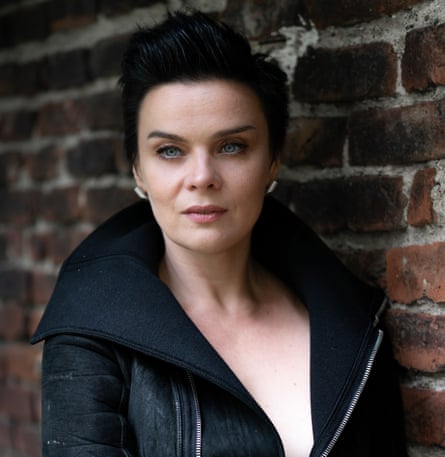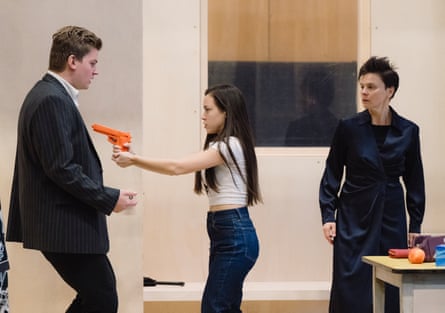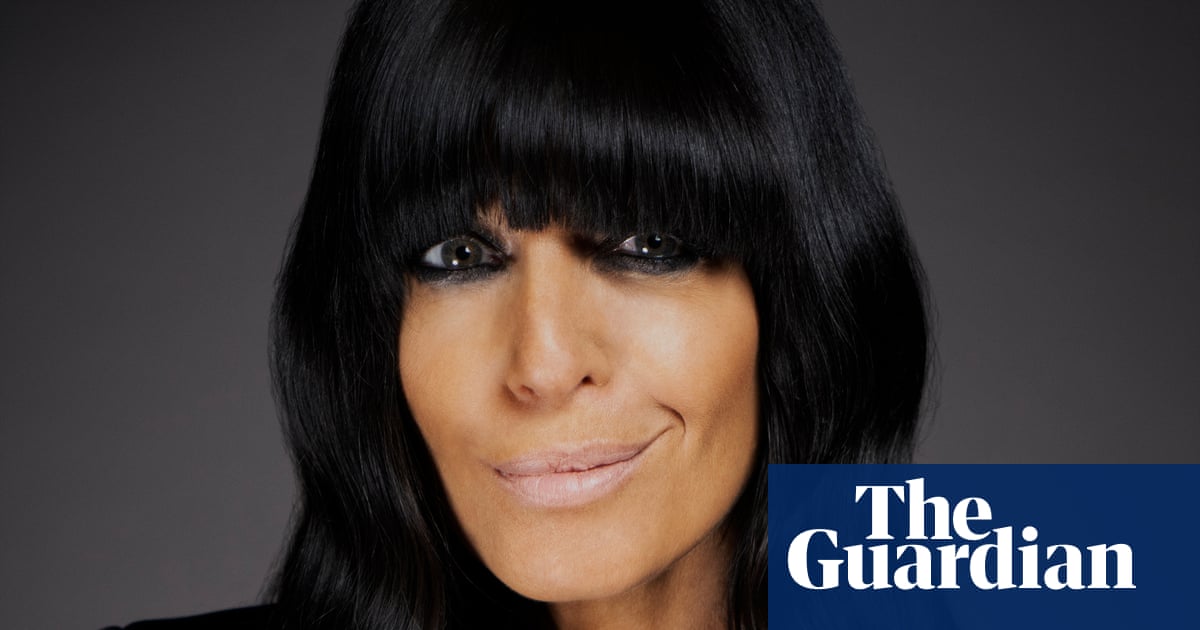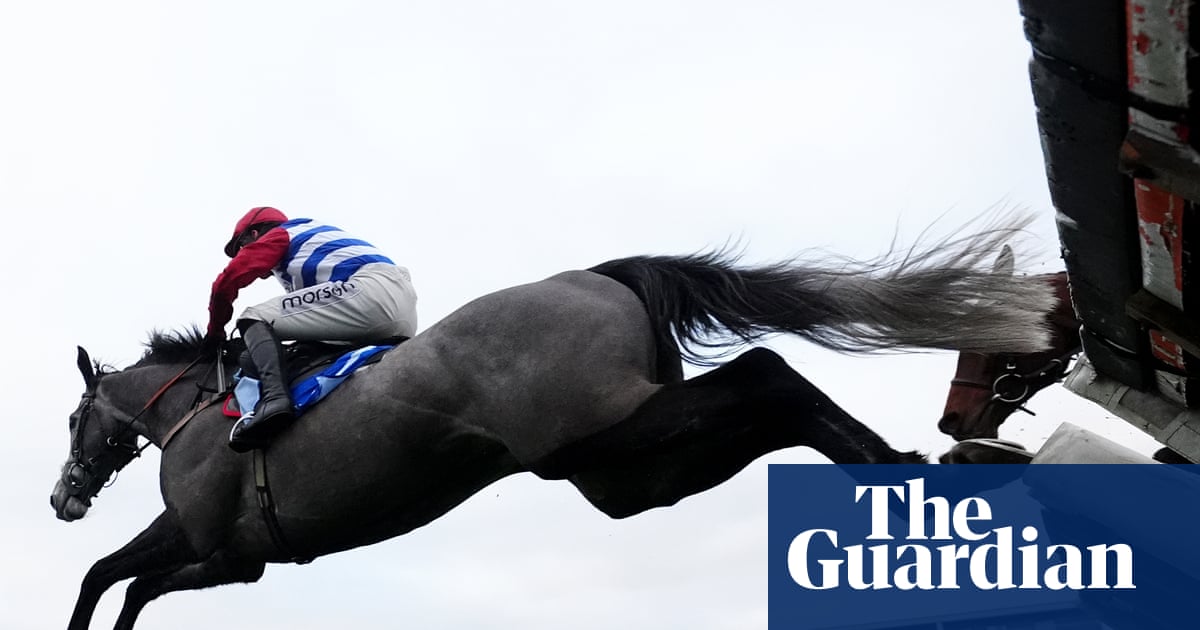Ausrine Stundyte has been in the room for just over two minutes when she looks me in the eye and declares: “I am totally not a feminist.” I am slightly taken aback. Moments earlier, I had been watching the Lithuanian soprano rehearse Leoš Janáček’s opera The Makropulos Case, which the Royal Opera is staging for the first time this autumn, in a new production by Katie Mitchell. Stundyte takes the work’s central role – and Mitchell is a director famous for her explicitly feminist approach.
Stundyte, it turns out, has also surprised herself. A few days after we speak, she emails a clarification: she isn’t against women’s rights. But it bothers her, she explains, when “women see men as the problem and themselves as victims. When you put yourself in the role of a victim, you give away your own power.”
This is unexpectedly relevant. Stundyte and I meet in the immediate aftermath of Mitchell telling the Times: “I’m bringing my work in opera to a close because of the misogyny.” As the industry’s social media feeds churn, Stundyte is impassive. I ask if she agrees that misogyny remains a problem in opera. “My personal feeling is that nowadays, especially after #MeToo, women have a very nice environment to live and work in. I personally have only good experiences.”
The atmosphere in that morning’s rehearsal, certainly, seemed a far cry from the systemic sexism that Mitchell reported suffering. Here, in fact, was an alternative model of rehearsal room power dynamics. Conductor Jakub Hrůša was in the pit, but Mitchell was unequivocally in charge. Her interventions were mainly periodic questions – “Jakub, was that OK for you with the vomiting?” – and cheerful encouragement. Jokes and compliments were scattered amid subtle adjustments made to technical minutiae and the timing of action on stage while Mitchell’s own references switch fluently between dramatic and musical cues.
Stundyte spent some of the rehearsal stretched out on a double bed in her character’s bedroom while a problem elsewhere was sorted out. “It’s a bit boring polishing the details,” she admits. “A lot of repeating and less artistic input. But I’m totally relaxed, and you know you have to sweat it out.”
There were no such painstaking preparations ahead of Stundyte’s Royal Opera debut in January 2024, when she stepped into the title role of Strauss’s Elektra at very short notice, replacing the indisposed star Nina Stemme. Stundyte was at home in Belgium on the fifth day of a week-long fast – “you could not plan worse” – when she got the call asking her to come to London. “I started eating,” she reassures me, and adds that at least because she hadn’t been expecting anything like this, she’d had a good night’s sleep before going on stage as one of opera’s most complex and challenging characters.

The Guardian’s Tim Ashley was among those impressed by Stundyte’s “remarkable” performance. Intensity burned off her even in that morning’s Janáček rehearsal. Stundyte has always admired singing actors over those who sing beautifully but don’t act. “If you want really to sing perfectly, it’s impossible to also act well, so you have to make compromises. But for me, acting is always something much more interesting. If I have to sing beautifully and I have to cut acting – that is, for me, torture.”
I suggest that Stundyte’s role in The Makropulos Case must pose particular challenges for her in terms of acting: Emilia Marty is over 300 years old and has effectively lived multiple lives, thanks to an elixir of immortality administered by her father in the 16th century. Stundyte is unfazed. “I don’t know how it is with you, but when I turned 30, it was a crisis. When I got to 40, it was crisis. Now I’m soon hitting 50, it’s again crisis. This time it’s a crisis because I fulfilled basically all my dreams. I’m really so, so grateful for life and destiny that I have everything what I wanted ever, but now I’m, like, empty. Like a little jellyfish.” A jellyfish? “All this harmony and peace and happiness is wonderful, but I kind of miss those adrenaline kicks because they were giving some massive extra power.”
She has no patience with anyone chasing immortality in real life today. “How is your life that fantastic that you can’t stop it? People are just afraid of death, you know. But I’m not. I’m quite sure that it will be wonderful. I’ve known this since I was a child.”

Stundyte’s existential optimism provides a stark contrast to her operatic roles. “My type is not the happy, sweet, blonde, jumping, sexy lady,” she says, grinning. No indeed: from Strauss’s Elektra and Salome to Katerina Izmailova in Shostakovich’s Lady Macbeth of Mtsensk, Janáček’s Kát’a Kabanová and beyond, Stundyte specialises in opera’s most heavyweight, grim soprano characters. “I was very depressed and very unhappy, especially around the teenager period. This incredible pain – I still remember it.” She pauses. “Probably this is still somewhere in me, and I can reconnect and recall it very easy. So I’m good at doing pain.”
Does she actually find these roles cathartic? “I wish theatre therapy would be something more widespread,” she says with sudden enthusiasm. “But being in this profession, you are forced to work with your own stuff. So I think I’m now quite good! I clean myself of a lot of baggage.” And yet Stundyte insists on the value of her own difficult past. “If you never experienced danger, if you never experienced pain, if you were never really hurt, how can you make opera believable?”

 1 month ago
32
1 month ago
32

















































